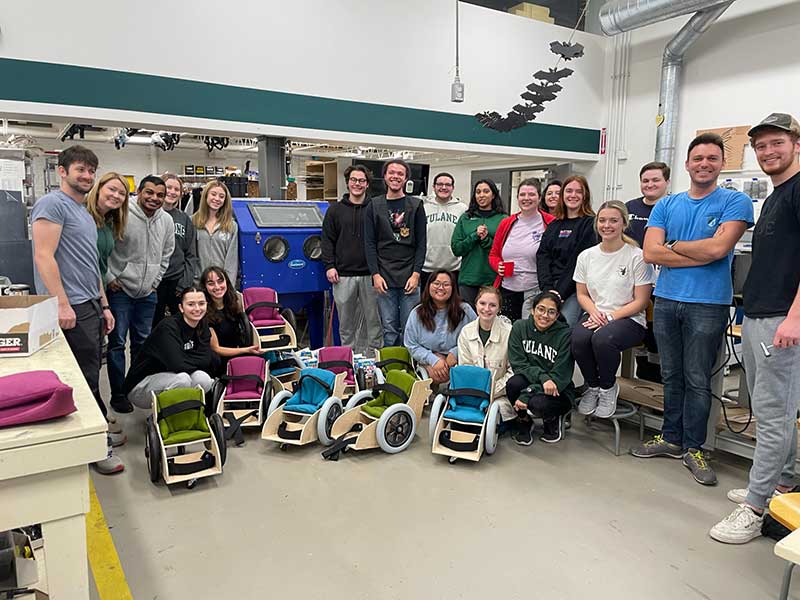Biomedical engineering students team up to design and make child-size wheelchairs
June 22, 2023
Barri Bronston Tulane biomedical engineering students, professors and advisors show off the child-size wheelchairs they made at the Scot Ackerman MakerSpace as part of a service learning project. (Photo by Gideon “Wills” Kpeli)Even with a pediatric wheelchair, learning how to get around on wheels can be challenging for a child, especially one with cerebral palsy, spina bifida or a limb deficiency. Turning, stopping and steering are all things that a child must master in order to feel confident and comfortable rolling from one spot to another.
Enter the Team Design students taught by Katherine Raymond, PhD, senior professor of practice and associate chair of biomedical engineering (BME) at Tulane University. As part of a service-learning project — a graduation requirement at Tulane — the team partnered with the nonprofit MakeGood to design and produce training wheelchairs, also called mobility trainers, to help children build independence and strength as they prepare for the real thing.
The idea to partner with Tulane students to create mobility trainers for kids originated from MakeGood, the local coordinator for TOM Global, an Israeli nonprofit that combines modern design and digital manufacturing to fulfill neglected needs of people with disabilities and limitations. TOM stands for Tikkun Olam, Hebrew for “repairing the world.”
Noam Platt, director of MakeGood, said insurance companies typically don’t cover the cost of a wheelchair for a child unless there is sufficient evidence that the child is able to use it effectively. Thus, the idea for the trainers was born.
“They are necessary tools for kids to build independence and strength to get them ready for a larger typical wheelchair,” Platt said. “These mobility trainers have been a huge hit with children in the area, and there is continued local demand for more of them.”
Making the wheelchairs involved 3D printing, laser cutting, woodworking, drilling, sewing and assembling, which the team of 30 students did at the Scot Ackerman MakerSpace at Tulane. They added padding and safety straps to the chairs, and they put together baskets of art supplies so the recipients could make the chairs their own.
But before they could even get to that point, they had to do a deep dive into the needs of the children who would ultimately receive the trainers, Raymond said. It’s part of the human-centered design process whereby students cultivate empathy for those who they will be serving
“Designers need to understand the needs deeply in order to solve them,” she said. “BME students do a great deal of researching, shadowing and interviewing before they even begin to ideate their solutions for medical problems
“Lots of our coursework in BME encourages us to prioritize the mental states of patients just as much as their physical states,” said Elana Kraversky, a member of the team who graduated in May and is now working as a device engineer at Pfizer in Chicago. “Knowing that we can make these kids happier, regardless of what they are going through, makes all the difference.”
Assembling the trainers took place over a couple of weekends, under the guidance of Raymond, Platt and Dylan A. Lucia, a visiting instructor who holds bachelor’s and master’s degrees in biomedical engineering from Tulane. He used his expertise in MakerSpace to assist with the assembly and help solve problems. One such challenge was modifying the designs from TOM to fit hardware and wood readily available in the United States. The Tulane School of Architecture also helped.
The team produced a total of 10 mobility trainers. They were donated to Ochsner Health — a partner of MakeGood — for use in pediatric occupational and physical therapy.
“We had so much fun,” said Anna LeJeune, a biomedical engineering graduate who will attend LSU Medical School in the fall. “The design was fairly new, so we had to work through a couple of issues with the assembly, but we were able to work together, and the chairs looked great in the end.”
“One of the strongest aspects of Tulane is its dedication to service,” said Kraversky. “As biomedical engineering students, there is no limit to the opportunities in New Orleans where we can make a difference. This was one of those opportunities.”
Raymond said it’s rewarding for students to see how their work is benefitting children with mobility challenges.
“I can’t help but think that putting in some weekend sweat, creating functional products that are immediately helping kids develop skills for wheelchair use, helps students to see the possibility of the long-term designing, prototyping and testing they are doing in the Team Design course,” she said. “They are ultimately doing all this work to help people with medical needs.”

